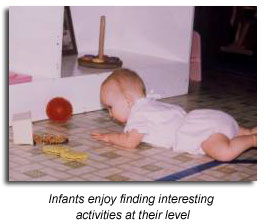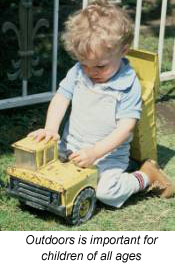MONTESSORI FOR INFANTS AND TODDLERS (Ages 0-3 years old)
Montessori for Infants and Toddlers is a growing movement in homes and in schools. One- to three-year-old children enjoy and are capable of successfully participating in a large variety of Montessori-like lessons that are developmentally appropriate for their age and ability level. These activities can be offered in your home or in a Montessori center. Key

ingredients to success are loving and stable caregivers (especially moms and dads), and a safe environment where children are free to move around and explore.
One- and two-year-olds love familiar toys and unstructured activities such as blocks, cars and trucks, dolls and doll clothes, clay and finger paint. They love to take long walks and to explore their outdoor environment. Toddlers can walk surprising distances when they are allowed to walk at their own pace.
Toddlers also love activities that have a defined purpose:

- Puzzles
- Counting materials
- Vocabulary lessons
- Fine motor activities such as pouring water or using tongs
- Arts and crafts to teach children specific skills, including scissors, paint, crayons, glue and paper
With practice and gentle reminders two-year-old children can be taught and expected to choose and carry a lesson to a table or rug, work on one lesson at a time and return a lesson to its place when finished. They can successfully understand many important social concepts:
- Waiting for someone else to finish their turn
- Watching but not touching someone else’s work
- Sharing with friends
In the properly prepared environment (where developmental needs are adequately met with interesting activities), toddlers often work on a lesson with focused concentration for long periods of time, repeating the activity again and again until they are satisfied.

Maria Montessori identified the primary developmental drives for ones and twos as:
- Coordination and control of movement
- Language acquisition and development
- Internalization of a logical sense of order
Montessori recommended a simple environment to offer children experiences in all of these areas. Children have a powerful tendency to repeat activities that engage their attention. It is this repetition that promotes independence, coordination, concentration and calm behavior, even in very young children. It is important not to intervene when you observe your child concentrating on an activity, particularly to offer unnecessary assistance.
The following story demonstrates our need to recognize and understand the developmental tendencies of young children.
She then proceeded to dump the box out and pick each clip up again. Then she repeated the process again– and again– and again. I realized, in awe, that the particular fingers my daughter was exercising were the ones she would soon use in learning to write.
For the next two weeks, almost every morning my little girl came in and repeated the same behavior. Then suddenly, whatever cycle of development that needed exercise was finished and she stopped coming in for the morning ritual.
This story illustrates that the prepared environment includes the adult who recognizes the child’s needs and tendencies. When we allow the child to repeat seemingly inconsequential actions stemming from a developmental need, we nurture optimal development.